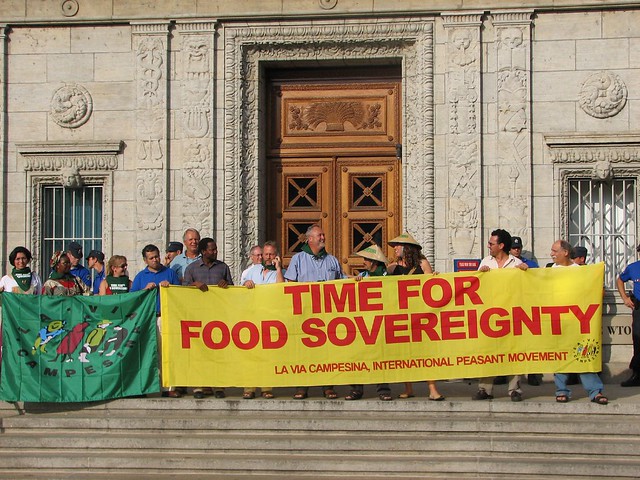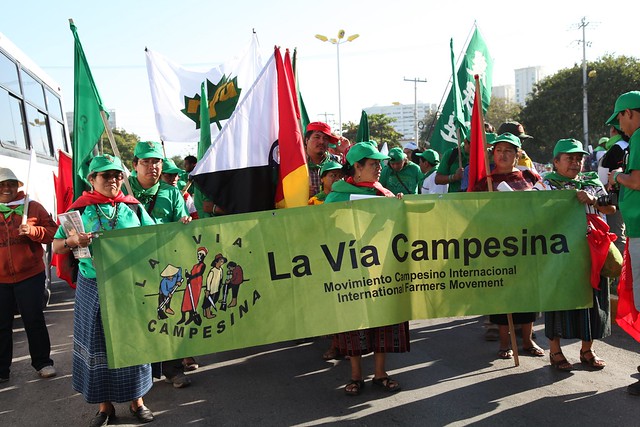Food sovereignty defined

The global food crisis: The right to decide what we eat
'Food sovereignty', the right of small farmers to chose what to eat and what to grow, is vital to feeding the world
"Food sovereignty" – people's right to decide what they eat and what they produce – is today one of the hottest topics debated around food policies.
It arose in the mid-1990s, when the debates around food policies were dominated by the globalisation of agribusiness and by food aid. At that time, peasants and small farmers who were – and still are – the world's main food producers saw that the policies implemented were serving large conglomerates and not the people – transforming small-scale agriculture into industrial plantations; dumping food surpluses from rich countries in poor ones; increasing the use of chemical pesticides and fertilisers; concentrating food production in the hands of multinationals.
While the World Trade Organisation was being invented in 1995, some small-farmer organisations from across the world came together to defend sustainable family farming. It was simply about producing healthy food for local markets while creating jobs and protecting the land and its diversity. The idea to call this "food sovereignty" emanated from these discussions, and was presented in 1996 at the Food and Agriculture Organisation's world food summit in Rome.
The genie was out of the box. The idea of food sovereignty was starting to get out of the fields and into decision-making. And it moved quickly. Jean Ziegler, the then UN special rapporteur on the right to food, brought the farmers' word to the UN. Some experts began debating it at the FAO; some governments, such as Ecuador and Bolivia, even included it in their constitutions. Thousands of farmers continued to practise it in their plot of land, and thousands of consumers continued to buy locally.
In 2007, Via Campesina felt the need to define better what peasants and small farmers really wanted. We organised a large forum in a village in Mali, called the Nyeleni Forum, assembling more than 700 people from various social movements: women's groups, trade unions, pastoralists, environmental organisations, urban poor, consumers, farmers and fisher folk.
Together, we defined food sovereignty as "the right of peoples to healthy and culturally appropriate food produced through sustainable methods, and their right to define their own food and agriculture systems. It puts the aspirations, needs and livelihoods of those who produce, distribute and consume food at the heart of the food systems and policies rather than the demands of markets and corporations."
Time has passed since the first farmers' groups expressed that new idea. It has now become blatantly obvious that the free market and agribusinesses won't feed the world. In 2008, the number of hungry people grew from 800 million to 1 billion, and since the onset of the latest food crisis over the past year, 44 million more people have fallen below the poverty line.
We believe that when they reflect the realities and the needs of hundreds of millions of people, some words can change the world. It is now time for food sovereignty to be implemented from the village communities to international policies. To start with, it is critical that peasants and rural communities are supported in reclaiming territories, keeping control over their land, and having access to water as a common good and a human right. Farmers, especially women, should have the right to use, save and exchange seeds, and local markets should be promoted.
• Ibrahim Coulibaly is a member of the international co-ordinating committee of Via Campesina and a member of the Coordination Nationale des Organisations Paysannes du Mali

Etiquetas: eng, Food sovereignty, Via Campesina

0 Comentarios:
Publicar un comentario
Suscribirse a Comentarios de la entrada [Atom]
<< Página Principal